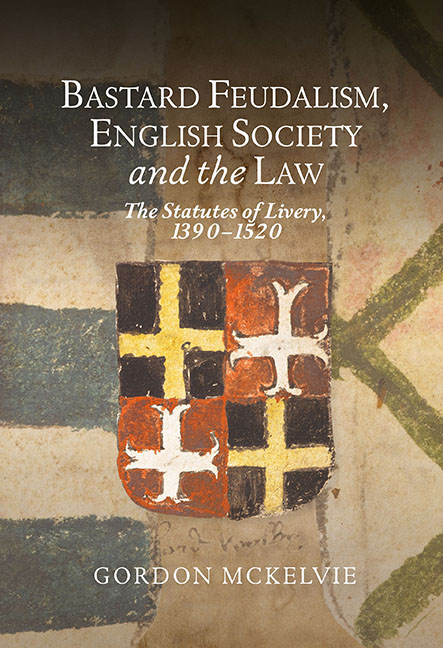Book contents
- Frontmatter
- Contents
- Acknowledgements
- Abbreviations
- Timeline of Parliamentary Activity
- Introduction
- Chapter 1 The System – Liveries and Retaining
- Chapter 2 The Early Years, 1390 to 1449
- Chapter 3 The Later Years, 1449 to 1520
- Chapter 4 Outcomes and Enforcement
- Chapter 5 The Identity of the Indicted
- Chapter 6 The Geography of the Cases
- Chapter 7 Networks and Localities
- Chapter 8 Livery and Disorder
- Chapter 9 The Urban Experience
- Conclusion
- Appendix 1 Number of Cases by Reign
- Appendix 2 Number of Cases in each County
- Appendix 3 List of Letters to Towns and Lordships
- Appendix 4 List of Local Ordinances
- Appendix 5 Letters from Henry VII to Duchy of Lancaster Officials
- Bibliography
- Index
- Frontmatter
- Contents
- Acknowledgements
- Abbreviations
- Timeline of Parliamentary Activity
- Introduction
- Chapter 1 The System – Liveries and Retaining
- Chapter 2 The Early Years, 1390 to 1449
- Chapter 3 The Later Years, 1449 to 1520
- Chapter 4 Outcomes and Enforcement
- Chapter 5 The Identity of the Indicted
- Chapter 6 The Geography of the Cases
- Chapter 7 Networks and Localities
- Chapter 8 Livery and Disorder
- Chapter 9 The Urban Experience
- Conclusion
- Appendix 1 Number of Cases by Reign
- Appendix 2 Number of Cases in each County
- Appendix 3 List of Letters to Towns and Lordships
- Appendix 4 List of Local Ordinances
- Appendix 5 Letters from Henry VII to Duchy of Lancaster Officials
- Bibliography
- Index
Summary
All history is social history and almost all history is political history. History is concerned with past societies and the politics of those societies are formed by various social, cultural, technological, religious and economic pressures. In one sense all are intertwined. Therefore, an understanding of the politics of a society is essential for understanding the nature of that society, its structure, its people and their concerns. Fundamental to this understanding are the political alignments and social bonds within that society. For the later middle ages, the affinity was ‘the most important political grouping’. It was composed of a lord and his various servants and followers, who were retained by a variety of methods. Historians have dubbed this system ‘bastard feudalism’. The phrase itself was not a contemporary one but it is a useful term to describe a set of socio-political relations that were most prominent during the late medieval period. At its heart was retaining, the most formal method of which was the indenture of retainer which bound a retainer to his lord, stating the expected service and rewards, notably fees, annuities and the benefits of ‘good lordship’. Other methods were more informal in character, such as the distribution of annuities and liveries to estate officials, or even more intangible, such as ‘hospitality, entertainment and favours incapable of precise definition and description’ which by their very nature rarely leave a trace in the surviving records. These relationships and groupings enabled late medieval governments and nobles to obtain the service they required, whether administrative, military or legal. In short, it was how late medieval politics, society and government functioned.
These relationships possessed the potential for social cohesion but they could also be used as a method of recruitment for serious breaches of public order. Retaining and distributing livery became associated with public order problems such as maintenance, riots, assaults, intimidation and, in extreme cases, rebellion. To prevent such abuses parliament passed a series of acts between 1390 and 1504 that restricted the distribution of livery, and later of fees, to members of a lord's family, his permanent household servants and his legal counsel.
- Type
- Chapter
- Information
- Bastard Feudalism, English Society and the LawThe Statutes of Livery, 1390–1520, pp. 1 - 11Publisher: Boydell & BrewerPrint publication year: 2020



